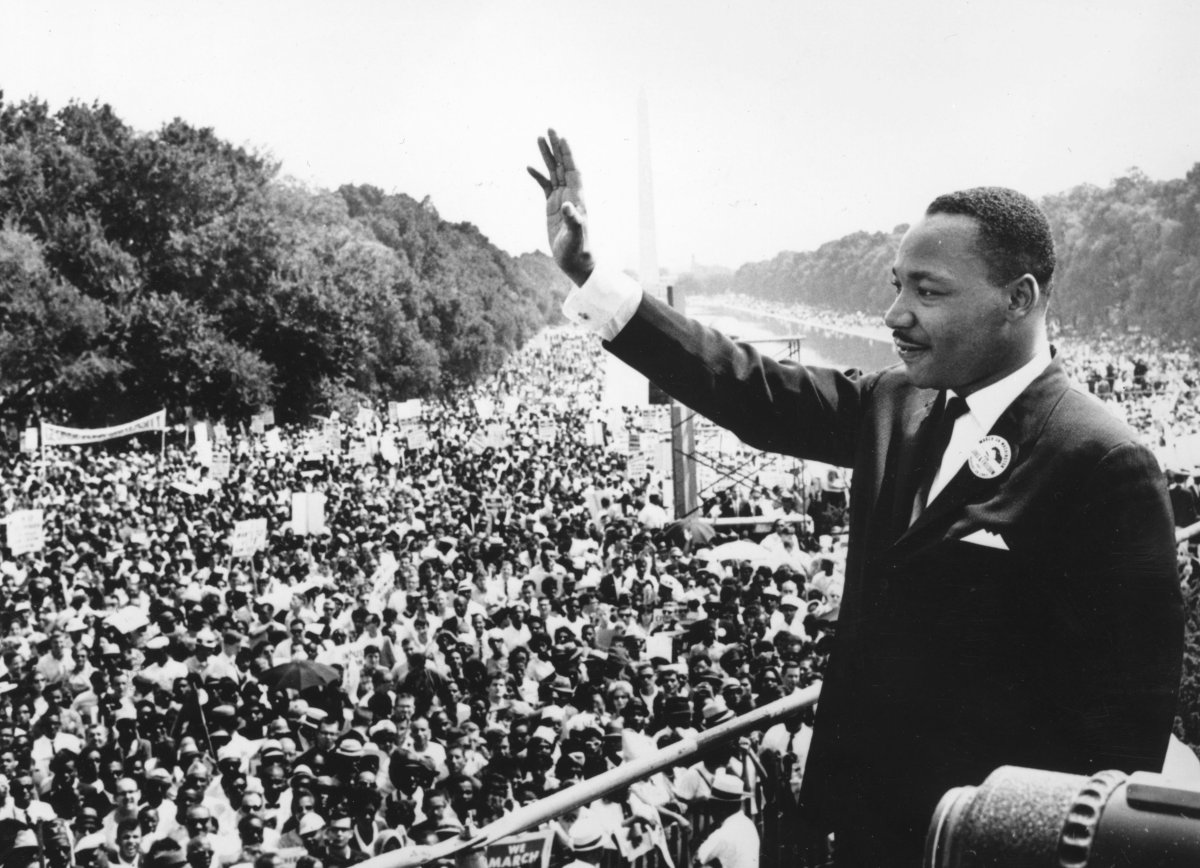Few Civil Rights leaders are as well-known and respected as Martin Luther King Jr. He was a staunch advocate for racial equality and ending segregation.
King's legacy lives on today as the fight for racial justice continues and is demonstrated in Black Lives Matter protests and calls for police reform.
Following the protests against police brutality during the 2020 summer, this Martin Luther King Day seems to have a greater significance than normal. To celebrate, Newsweek has compiled 11 quotes from some of King's most famous speeches.
"I have a dream that one day this nation will rise up and live out the true meaning of its creed: 'We hold these truths to be self-evident, that all men are created equal.'" —"I Have a Dream," March on Washington. Washington, D.C., on August 28, 1963, per The Martin Luther King Jr. Research and Education Institute at Stanford.
"I have a dream that my four little children will one day live in a nation where they will not be judged by the color of their skin but by the content of their character." —"I Have a Dream."
"I conclude that this award which I receive on behalf of that movement is a profound recognition that nonviolence is the answer to the crucial political and moral question of our time—the need for man to overcome oppression and violence without resorting to violence and oppression. Civilization and violence are antithetical concepts. Negroes of the United States, following the people of India, have demonstrated that nonviolence is not sterile passivity, but a powerful moral force which makes for social transformation." —Nobel Peace Prize Acceptance Speech. Oslo, Norway on December 10, 1964, per the Nobel Prize.
"I refuse to accept the view that mankind is so tragically bound to the starless midnight of racism and war that the bright daybreak of peace and brotherhood can never become a reality." —Nobel Peace Prize Acceptance Speech
"The only normalcy that we will settle for is the normalcy that recognizes the dignity and worth of all of God's children. The only normalcy that we will settle for is the normalcy that allows judgment to run down like waters, and righteousness like a mighty stream. The only normalcy that we will settle for is the normalcy of brotherhood, the normalcy of true peace, the normalcy of justice." —"Our God Is Marching On." Montgomery, Alabama on March 25, 1965, per The King Institute
"And I must say tonight that a riot is the language of the unheard. And what is it America has failed to hear? It has failed to hear that the plight of the Negro poor has worsened over the last 12 or 15 years. It has failed to hear that the promises of freedom and justice have not been met. And it has failed to hear that large segments of white society are more concerned about tranquility and the status quo than about justice and humanity." —"The Other America." Grosse Point, Michigan on March 14, 1968, per the Grosse Point Historical Society
"Then came the buildup in Vietnam, and I watched this program broken and eviscerated as if it were some idle political plaything on a society gone mad on war. And I knew that America would never invest the necessary funds or energies in rehabilitation of its poor so long as adventures like Vietnam continued to draw men and skills and money like some demonic, destructive suction tube. So I was increasingly compelled to see the war as an enemy of the poor and to attack it as such." —"Beyond Vietnam." New York, New York on April 4, 1967, per American Rhetoric
"As I have walked among the desperate, rejected, and angry young men, I have told them that Molotov cocktails and rifles would not solve their problems. I have tried to offer them my deepest compassion while maintaining my conviction that social change comes most meaningfully through nonviolent action. But they ask—and rightly so—what about Vietnam? They ask if our own nation wasn't using massive doses of violence to solve its problems, to bring about the changes it wanted." —"Beyond Vietnam"
"When the Constitution was written, a strange formula to determine taxes and representation declared that the Negro was 60 percent of a person. Today another curious formula seems to declare he is 50 percent of a person. Of the good things in life he has approximately one-half those of whites; of the bad he has twice those of whites. Thus, half of all Negroes live in substandard housing, and Negroes have half the income of whites. When we turn to the negative experiences of life, the Negro has a double share. There are twice as many unemployed. The rate of infant mortality among Negroes is double that of whites and there are twice as many Negroes dying in Vietnam as whites in proportion to their size in the population." —Where Do We Go From Here: Chaos or Community? (1967) per The Atlantic.
"It is incontestable and deplorable that Negroes have committed crimes, but they are derivative crimes. They are born of the greater crimes of the white society. When we ask Negroes to abide by the law, let us also demand that the white man abide by law in the ghettos." —"The Role of the Behavioral Scientist in the Civil Rights Movement." Washington D.C. at the American Psychological Association Convention on September 1, 1967, per the APA.
"Give us the ballot, and we will no longer have to worry the federal government about our basic rights.… Give us the ballot, and we will quietly and nonviolently, without rancor or bitterness, implement the Supreme Court's decision of May seventeenth, 1954." —"Give Us the Ballot." Washington D.C. on May 17, 1957, per The King Institute

Uncommon Knowledge
Newsweek is committed to challenging conventional wisdom and finding connections in the search for common ground.
Newsweek is committed to challenging conventional wisdom and finding connections in the search for common ground.
About the writer
To read how Newsweek uses AI as a newsroom tool, Click here.








